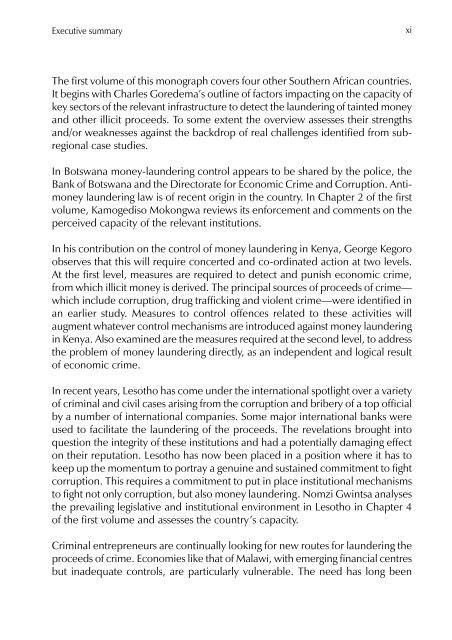Monograph 108 complete download - Institute for Security Studies
Monograph 108 complete download - Institute for Security Studies
Monograph 108 complete download - Institute for Security Studies
You also want an ePaper? Increase the reach of your titles
YUMPU automatically turns print PDFs into web optimized ePapers that Google loves.
Executive summary<br />
xi<br />
The first volume of this monograph covers four other Southern African countries.<br />
It begins with Charles Goredema’s outline of factors impacting on the capacity of<br />
key sectors of the relevant infrastructure to detect the laundering of tainted money<br />
and other illicit proceeds. To some extent the overview assesses their strengths<br />
and/or weaknesses against the backdrop of real challenges identified from subregional<br />
case studies.<br />
In Botswana money-laundering control appears to be shared by the police, the<br />
Bank of Botswana and the Directorate <strong>for</strong> Economic Crime and Corruption. Antimoney<br />
laundering law is of recent origin in the country. In Chapter 2 of the first<br />
volume, Kamogediso Mokongwa reviews its en<strong>for</strong>cement and comments on the<br />
perceived capacity of the relevant institutions.<br />
In his contribution on the control of money laundering in Kenya, George Kegoro<br />
observes that this will require concerted and co-ordinated action at two levels.<br />
At the first level, measures are required to detect and punish economic crime,<br />
from which illicit money is derived. The principal sources of proceeds of crime—<br />
which include corruption, drug trafficking and violent crime—were identified in<br />
an earlier study. Measures to control offences related to these activities will<br />
augment whatever control mechanisms are introduced against money laundering<br />
in Kenya. Also examined are the measures required at the second level, to address<br />
the problem of money laundering directly, as an independent and logical result<br />
of economic crime.<br />
In recent years, Lesotho has come under the international spotlight over a variety<br />
of criminal and civil cases arising from the corruption and bribery of a top official<br />
by a number of international companies. Some major international banks were<br />
used to facilitate the laundering of the proceeds. The revelations brought into<br />
question the integrity of these institutions and had a potentially damaging effect<br />
on their reputation. Lesotho has now been placed in a position where it has to<br />
keep up the momentum to portray a genuine and sustained commitment to fight<br />
corruption. This requires a commitment to put in place institutional mechanisms<br />
to fight not only corruption, but also money laundering. Nomzi Gwintsa analyses<br />
the prevailing legislative and institutional environment in Lesotho in Chapter 4<br />
of the first volume and assesses the country’s capacity.<br />
Criminal entrepreneurs are continually looking <strong>for</strong> new routes <strong>for</strong> laundering the<br />
proceeds of crime. Economies like that of Malawi, with emerging financial centres<br />
but inadequate controls, are particularly vulnerable. The need has long been
















